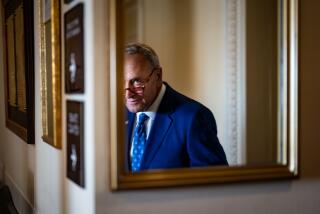Bush Sabotaged Bias Bill Talks, Mitchell Charges
- Share via
WASHINGTON — Senate Majority Leader George J. Mitchell (D-Me.) charged Monday that President Bush has created racial disharmony and sabotaged private talks aimed at forging a compromise on legislation to combat job discrimination against minorities and women.
Expressing hope--but no optimism--that an agreement may yet be reached, Mitchell said that four Democratic senators he appointed are working with nine moderate Republicans in an effort to reach a consensus on a bill that would be acceptable to Bush.
But the impasse is unlikely to be resolved as long as Bush insists on passage of his own legislative proposal, which most congressional Democrats and some Republicans oppose as doing too little to protect against job bias, Mitchell said.
The pointed criticism by the Senate leader, who until recently had refrained from personal attacks on Bush, underscores the unusually deep divisions between the Democratic-controlled Congress and the Administration over civil rights legislation.
The dispute, which Mitchell called a potentially explosive issue “with enormous implications for our society,” involves legislation designed to reverse a series of 1989 Supreme Court decisions that narrowed the scope of laws prohibiting job discrimination.
Bush contends that a pending Democratic-sponsored measure would force employers to adopt rigid hiring quotas for minorities and women to protect themselves against possible discrimination lawsuits. The President wants Congress to pass an alternative Administration bill.
Mitchell said that Bush “sabotaged” private talks in April between big business and civil rights groups “because they were on the verge of success” in efforts to reach a compromise on civil rights legislation. The Business Roundtable, a coalition of leading U.S. corporations, pulled out of the talks under pressure from the White House.
While several presidents have used the power of the White House to advance racial harmony, Bush “has done the opposite,” Mitchell said. The majority leader’s extraordinarily harsh attack on the President came during a luncheon session with a group of reporters.
The White House declined to respond to Mitchell’s criticism of the President, but Bush, accusing Democrats of seeking “a political win” on the issue, recently charged that lawmakers “want to grind me into the political dirt.”
“I want a fair, strong anti-discrimination bill that will guarantee workers’ rights, women’s rights, workplace rights, but will not create quotas,” the President had said.
In his session with reporters, Mitchell also attacked Bush’s anti-crime bill, calling it “an embarrassing intellectual mishmash . . . designed to get votes, not to reduce crime.” The legislation contains provisions that would expand the federal death penalty, impose new restrictions on Death Row appeals and make it easier to introduce illegally seized evidence in court. “It’s distressing the way Bush has been able to get away with this,” he said.
In answer to questions, Mitchell said he still has no plans to seek the Democratic presidential nomination next year, although he confirmed that several of his fellow senators have urged him to run.
Expanding on the civil rights debate, Mitchell called race “the most divisive issue in our nation’s history and an irresistible temptation for political exploitation.” In earlier times, Democrats exploited race for political purposes, he said, “but in recent years it’s been the Republicans, and they have done it with overtness . . . no attempt to hide it.”
The Democratic-sponsored bill was approved by the House, 273 to 158, earlier this month. Bush has signaled his intent to veto the measure if approved by the Senate, and the House tally was 15 votes shy of the two-thirds majority needed to override. In a separate vote, the House rejected the Bush-backed civil rights bill, 266 to 162.
The differences between the two measures are small, “and people of good will should be able to reconcile the differences,” Mitchell said. “I hope the Administration will become involved” in the efforts to forge a compromise, he said. But when pressed, Mitchell indicated he was not optimistic about chances of reaching an agreement acceptable to Bush.
However, a spokesman for Sen. Edward M. Kennedy (D-Mass.), one of the four Democrats Mitchell named to work with Republicans on a possible compromise, said Kennedy feels that chances for achieving an agreement “are still reasonably good.”
More to Read
Get the L.A. Times Politics newsletter
Deeply reported insights into legislation, politics and policy from Sacramento, Washington and beyond. In your inbox twice per week.
You may occasionally receive promotional content from the Los Angeles Times.










